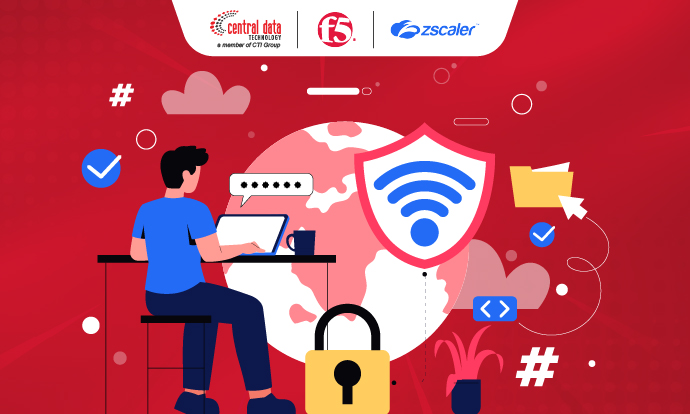
VPN alternatives are becoming increasingly popular among businesses seeking better security, optimal performance, and solutions tailored to modern digital needs. While traditional VPNs are still in use, new technologies offer smarter and more flexible approaches to protecting data and supporting digital transformation. This article will explore the advantages, drawbacks of traditional VPNs, and the alternatives that can help your business stay secure and efficient in the digital era.
What is VPN

A Virtual Private Network (VPN) is a technology that establishes a secure and encrypted connection over the internet between a user and a network or server. By doing so, it safeguards data from interception, masks the user’s IP address, and ensures privacy, especially on public networks.
VPNs are commonly used for personal privacy and business security. For businesses, VPNs create a secure channel for employees to access internal resources, especially in remote work scenarios, ensuring data remains protected even when accessed from public Wi-Fi or other unsecured networks.
Despite their widespread use, VPNs are increasingly being complemented or replaced by advanced alternatives like Zero Trust Network Access (ZTNA) and Software-Defined Perimeters (SDP), which offer more granular control and better support for cloud-native environments. These newer solutions emphasize tighter access management and improved scalability, addressing some of the limitations of traditional VPNs.
Shortcomings of VPNs for Remote Working
As remote work has transitioned to a standard practice, virtual private networks (VPNs) as once the go-to solution for securing connections between corporate networks and remote devices, are now facing significant challenges. Companies must recognize the limitations of VPNs to ensure they meet the evolving needs of their organizations.
Recognizing VPNs limitations, businesses need to evaluate more robust and modern alternatives, ensuring that their remote work infrastructure is secure, scalable, and aligned with today’s demands.
User Experience
VPNs aim to replicate the level of network access users have on-site by connecting remote devices to a secure corporate network, often hosted in a data center. However, this approach often results in slower connections and increased network latency, negatively impacting user productivity.
Additionally, users are required to regularly log in and authenticate their devices to maintain network security. While necessary, this periodic authentication adds friction to remote work and makes it less efficient compared to working directly on-premises.
Visibility
As VPN usage expands, managing network visibility becomes increasingly complex. With individual users and remote offices forming sprawling, interconnected networks, businesses face difficulties in monitoring and securing these extended environments. The more extensive the network, the greater the trade-off between ensuring clear visibility and providing seamless device access.
Security
VPNs rely on open ports to establish connections, which are common targets for cyberattacks. While enterprise-grade VPNs should include features like multi-factor authentication (MFA) and data encryption during transit, not all VPN solutions enforce these critical security measures.
Remote work also introduces additional vulnerabilities through home networks, which are beyond the control of corporate IT teams. Without the ability to push updates or security patches to personal devices, routers, or switches, IT teams cannot fully secure remote endpoints.
Another security challenge stems from the point-to-point nature of VPN connections. This design ensures encryption only between designated endpoints, leaving gaps for attackers to exploit. The increasing number of connections amplifies the workload required for monitoring and inspecting traffic. When these workloads are hosted in the cloud, it adds another layer of complexity to an already demanding process.
Is VPN Obsolete?
VPN depends on the evolving security needs and technological landscape. While traditional VPNs remain widely used, especially for secure remote access, they have limitations that make them less suitable for modern, distributed work environments. Alternatives such as Zero Trust Network Access (ZTNA) and Software Defined Perimeters (SDP) address these shortcomings and are increasingly preferred in specific use cases.
Allowing users to access private network remotely, VPN secure network connection by creating encrypted tunnels. However, it also faces several challenges:
- Over-permissive Access: Once authenticated, users often have broad access to the network, increasing the risk if credentials are compromised.
- Scalability Issues: Traditional VPNs struggle to scale efficiently in large or dynamic environments.
- Complexity: Deployment and management can be resource-intensive, requiring dedicated hardware and expertise.
- Security concerns: VPNs cannot inherently verify user identity beyond login credentials, leaving them vulnerable to attacks like phishing or insider threats.
Read More: Must Know! Effective Strategies to Strengthen Cloud Computing Security in the Digital Era
Benefit of Using a VPN
A good VPN can help you navigate the internet more securely and freely, to enhance your online experience with minimal disruption. Here are some benefits of using VPN:
- Enhanced Privacy and Security: A VPN encrypts your internet traffic, making it difficult for third parties like hackers or Internet Service Providers (ISPs) to monitor your online activities. This protects your data from interception and surveillance.
- Masking Your IP Address: VPNs hide your real IP address by routing your connection through their servers, making it harder to track your online behavior and build a profile based on your activities.
- Bypassing Censorship and Geo-Restrictions: VPNs can help you access content that might be blocked or restricted in certain regions. This is especially useful for bypassing government censorship or accessing streaming services unavailable in your location.
- Avoiding Bandwidth Throttling: ISPs may slow down your connection when you’re streaming or gaming during peak hours. With a VPN, the ISP can’t see the specific nature of your traffic, which helps prevent throttling.
- Improved Online Gaming Experience: VPNs can protect against Distributed Denial of Service (DDoS) attacks and help maintain stable connection speeds. This can be beneficial for gamers who need to stay connected and avoid disruptions.
Do We Need to Switch to Alternative VPN Solutions?
VPNs are commonly used for enhancing security, protecting privacy, and bypassing regional restrictions. However, recent discussions highlight the importance of exploring alternative solutions to traditional VPNs. Here are some reasons why businesses need to find alternatives:
- Performance Issues: VPNs can sometimes lead to slower internet speeds as data must be encrypted and routed through a VPN server, impacting overall performance.
- Complex Setup and Management: Configuring and maintaining VPNs can be challenging, especially for larger organizations. Ensuring seamless access for all employees while maintaining robust security can be complicated.
- Single Point of Failure: A VPN server outage could disrupt connectivity for all connected users. Solutions that are distributed or utilize a network of interconnected nodes offer better redundancy.
- Security Concerns: While VPNs are designed to secure data, they are not immune to breaches. A compromised VPN server can potentially expose a significant amount of user data.
What Can be Considered as an Alternative to VPN?

Before switching from using VPN technology, businesses must consider the solution that is able to elevate secure communication and share data between employees, digital resources, and third parties. There are some alternatives to VPM that can be considered to VPNs, including Zero Trust Network Access (ZTNA), Software-Defined Wide Area Network (SD-WAN), and Multiprotocol Label Switching (MPLS).
These alternatives for VPNs differ in architecture and technology, but they have in common a high level of security, scalability to cope with evolving business needs, reliability, and compatibility with hybrid environments. Each of the alternatives differs by deployment complexity, feature se, ease of use, and costs.
What Cannot be Considered as an Alternative to VPN?
When exploring alternatives to VPN technology, the goal is to enhance an organization’s security by enabling secure (private) communication and data exchange between employees, digital resources, and third parties. This is why proxy servers, despite often being mentioned, are not a suitable replacement for VPNs in a professional business context.
Proxies act as intermediaries between a user and the internet, masking the user’s original IP address to bypass geographic restrictions or unblock certain services, such as Netflix. While they may serve as a substitute for personal VPNs in some cases, they fall short as a professional VPN alternative.
Secure Alternatives to VPN
With apps and remote users everywhere, the need for new, secure VPN alternatives has become more urgent. Here are some secure alternatives to VPN.
Zero Trust Network Access (ZTNA)
Zero Trust Network Access (ZTNA) has become essential for protecting applications and data. It prevents lateral movement, mitigates Layer 7 threats, and simplifies policies for least-privileged access. Advanced ZTNA (ZTNA 2.0) solutions grant users only the access they need for their tasks while continuously validating trust levels and scanning all traffic for potential threats.
Zero Trust is a cybersecurity strategy designed to eliminate implicit trust in digital interactions, requiring continuous validation at every stage. This approach is achieved through strong authentication and authorization, often routing access requests through an access broker. If a user is authorized, the broker grants access and facilitates direct communication with the application.
Secure Access Service Edge (SASE)
As remote work and Software as a Service (SaaS) have become more prevalent, the trend of directing traffic to various cloud-based services instead of traditional data centers has also increased. SASE (Secure Access Service Edge) has emerged as a solution to provide secure, seamless access for remote users.
One of the main advantages of SASE is the flexibility offered by its cloud-based infrastructure. This facilitates the deployment of security services such as threat prevention, DNS security, sandboxing, credential theft prevention, web filtering, and advanced firewall policies with greater ease.
Software-Defined Wide Area Network (SD-WAN)
In traditional network architecture, the WAN depends on physical devices such as routers to connect branch or remote users to the corporate network and data center. Data flow between sites is governed by rules and policies configured on each network device, often following a hub-and-spoke model where the data center acts as the hub and remote or branch offices serve as spokes. Managing these site-to-site connectivity rules and policies is time-intensive and prone to errors. In response, software-defined WAN (SD-WAN) has emerged, shifting the control and management of data flow from physical hardware to centralized software.
This shift enables network administrators to create, configure, and deploy new rules and policies network-wide simultaneously. Compared to VPNs, SD-WANs are more cost-effective, offer better performance, and provide increased reliability. They include features like quality of service (QoS) and application-aware routing, enabling cloud integration in ways that VPNs cannot.
The Benefits of VPN Alternatives
VPN alternatives offer several benefits over traditional VPNs:
- Enhanced Security: Modern solutions provide context-aware access control, reducing data breach risks and supporting regulatory compliance.
- Improved Performance: Optimized routing and cloud-native structures overcome VPN performance limitations like latency.
- Scalability: These alternatives adapt seamlessly to growing user bases and infrastructure needs.
- Cloud Integration: They ensure secure, efficient access to cloud resources, leveraging cloud-native encryption and flexible security measures.
Why Your Businesses Need VPN Alternatives?
Businesses should consider VPN alternatives for enhanced security, better network performance, and cost efficiency. VPNs can introduce latency, limit scalability, and might not adequately support modern cloud-based operations or mobile workforces.
Alternatives like Zero Trust Network Access (ZTNA) and Secure Access Service Edge (SASE) offer robust, flexible solutions by focusing on user identity, device security, and location-independent access, making them more suited for modern business needs. These alternatives provide better visibility, faster performance, and adaptable security postures.
The Best VPN Alternatives from CDT
To safeguard your online privacy and access restricted content, while maintaining speed and security, Central Data Technology offers comprehensive solution for the best VPN alternatives. Here are two solutions for the best VPN alternatives from CDT.
F5
F5 provides a robust alternative to traditional VPN solutions by leveraging its centralized access management capabilities. This approach ensures that user identity and access policies are uniformly applied across cloud, on-premises, and hybrid environments, promoting a consistent and secure experience.
This solution offers some benefits below:
- Enhanced security by adopting a Zero Trust security model, to minimize attack surfaces and enforce strict, least-privilege access to resources. This means that no user or device is trusted by default, and verification is required for every access attempt, which significantly reduces the risk of unauthorized access and potential breaches.
- F5 streamlines identity management with features like Single Sign-On (SSO) and centralized identity federation, simplifying user authentication across various applications for operational efficiency. This not only reduces user friction but also lessens administrative workload, allowing IT teams to focus on more strategic tasks.
- These solutions are highly adaptable, offering customizable policy frameworks that can accommodate both modern, cloud-native applications and legacy systems. This flexibility allows organizations to scale securely as their technology needs evolve, without compromising on security or user experience.
- F5 ensures that users can access multiple applications seamlessly with unified login processes to improve user experiences. This eliminates the need for repeated logins, enhancing productivity and user satisfaction while maintaining strong security controls.
Five key features of F5:
- Granular Contextual Access: Access decisions are based on real-time validation of user identity, device health, and session context. This feature provides fine-tuned access control, making sure that only properly verified users and secure devices can access critical resources.
- Multi-Method Authentication: F5 supports a variety of authentication mechanisms, including traditional credentials and modern multi-factor authentication (MFA). This includes integration with major identity providers such as Okta, Azure AD, and Google, which enhances flexibility and security.
- Centralized Policy Enforcement: Security policies can be deployed and enforced consistently across all environments, maintaining a unified security posture. This centralization ensures that rules are applied uniformly, reducing configuration errors and potential security gaps.
- Single Sign-On (SSO): The solution integrates seamlessly with both SAML-enabled and non-SAML-enabled applications, enabling users to access all necessary resources without needing to log in multiple times. This boosts productivity and reduces login fatigue.
- Device Posture Assessment: F5 evaluates the security posture of user devices, ensuring that only compliant endpoints are granted access. If a device does not meet predefined security standards, access can be denied or limited, adding another layer of protection against compromised devices.
Zscaler
Zscaler offers a modern approach to secure private app access by moving beyond traditional network-centric VPN solutions. Unlike VPNs, which connect users to networks, Zscaler connects users directly to the applications they need with AI-powered user-to-app segmentation to enhances security by preventing lateral threat movement and reducing the attack surface through inside-out connectivity. Here are four benefits of Zscaler:
- Secure private app access from anywhere without the risks associated with traditional VPNs.
- Fast access for all users for seamless, high-performance connections without the delays typically experienced with legacy VPN solutions.
- Reduced cost and complexity by eliminating the need for complex hardware and configurations.
- Goes beyond private app access for comprehensive solutions that extend security and connectivity beyond simple app access.
Key Features of Zscaler:
- Zero Trust Access: Enforces least-privilege policies that ensure only authorized users and devices can access specific applications, enhancing security.
- AI-Driven Insights: Utilizes artificial intelligence for real-time app segmentation and policy recommendations to proactively reduce attack surfaces.
- Browser-Based Access: Provides secure, lightweight, infrastructure-agnostic browser-based connections, enabling easy and fast access to applications without requiring client installations.
- Holistic Threat Prevention: Includes robust data protection measures like Web Data Loss Prevention (DLP) and endpoint DLP, safeguarding sensitive information from exposure.
- Business Continuity Support: Maintains uninterrupted, secure access even during black swan events or network outages, ensuring resilience and reliability.
VPN Alternatives Solution Only at CDT
Ensure your business data and privacy are secure by implementing F5 and Zscaler as alternative VPN solutions from Central Data Technology (CDT). As part of the CTI Group, CDT is equipped to address complex digital security challenges.
Visit the official CDT website and contact our sales team for more information on alternative VPN solutions tailored to your organization’s needs.
Author: Ervina Anggraini – CTI Group

